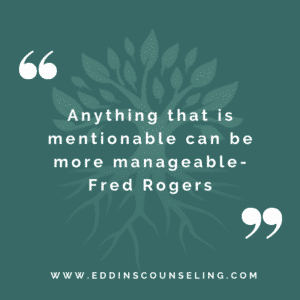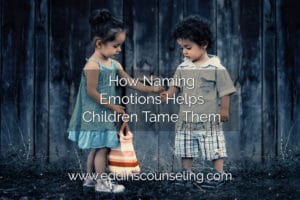October 21, 2019
How Naming Emotions Helps Children Tame Them
Written by Rachel Eddins
Posted in Child Counseling and with tags: emotional health, parenting

 The inimitable Fred Rogers often stated: “Anything that is mentionable can be more manageable.” This simple sentiment on the importance of naming emotions has become an important aspect of helping children develop healthfully, productively and creatively. In fact, renowned neuropsychiatrist Dr. Dan Siegel calls it “mindsight.”
The inimitable Fred Rogers often stated: “Anything that is mentionable can be more manageable.” This simple sentiment on the importance of naming emotions has become an important aspect of helping children develop healthfully, productively and creatively. In fact, renowned neuropsychiatrist Dr. Dan Siegel calls it “mindsight.”
What Our Children Need
According to Siegel, some basic childhood needs can be expressed in 4 “S” words. Children need to be:
- Seen: This is most specifically what is meant by “mindsight.” More than visual seeing, children need to be perceived. Siegel saw it as sensing the mind behind a child’s behavior.
- Safe: Children want help to avoid being frightened or hurt and the responses these actions inspire.
- Soothed: Every child experiences emotions and situations that are difficult. Conversely, this means a lot of attention paid to soothing.
- Secure: Adults and caretakers have the responsibility to help children develop a sense of well-being.
The Problems of NOT Naming Emotions
When children cannot name their emotions, they have difficulty:
- Understanding what they are feeling
- Understanding why they feel as they do
- Deciding how to respond to their emotions
Of key importance of our emotions is our reaction. When children can’t name their feelings, they cannot understand them. Also, as Mr. Rogers says above, they cannot manage them. Naming emotions goes a long way toward discovering socially acceptable behavior. Naming emotions is the beginning of expressing them in a healthy manner.
How to Help Children Understand the Importance of Emotions
Parents can directly impact their children’s ability to understand and process what they are feeling. Two basic steps include:
1. Make Emotions a Priority
You can teach children a lot, based on what you emphasize. For example, you may relentlessly remind them about avoiding circumstances that put their physical well-being at risk. This steady input shapes a kid’s perceptions and behavior. You can and must do the same with emotions.
Regularly encourage children to ponder what they are feeling and why. This can be done by pointing out the cues they are offering. “You seem angry right now,” you might say. Let them know why you assume this. When possible, ask them about the cues other children are providing. Make emotions a non-taboo topic. Normalize such conversations and make your children comfortable with such subject matter.
2. Get Creative With the Naming of Emotions
Everything is more fun — and more memorable — when it’s a game. You can take turns with your child, acting out different emotions. Go through the vast emoji options and identify which emotions are being expressed. When enjoying a TV show or movie, talk about the feelings of the characters. Don’t forget to also discuss how those characters express (or not) their emotions. Name these emotions and assign some judgment to the behavior such feelings provoke.
As with #1 above, the goal is to strip away the stigma of discussing feelings. In addition, a parallel goal is to explain that we are all responsible for our behavior choices. No matter how strong an emotion hits us, we must all find healthy and productive ways to express it.
When Both Parents and Children Could Use Some Help
 What if both children and their parents aren’t honoring the importance of sharing feelings?
What if both children and their parents aren’t honoring the importance of sharing feelings?
There are unique factors involved in childhood emotions. However, adulthood doesn’t automatically translate into maturity. This is why both parents and their children can benefit so greatly from counseling. The parent-child dynamic can be a tsunami of conflicting and confusing emotions. Working with a guide — together or individually — can help us make sense of this dynamic. In turn, it can teach us to name our own emotions as we model such behavior for our youth. Eddins Counseling Group located in Houston, TX has therapists that specialize in parenting, child counseling, and family counseling. Reach out today by calling 832-559-2622 or book an appointment online.
















